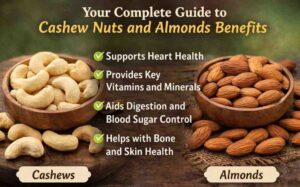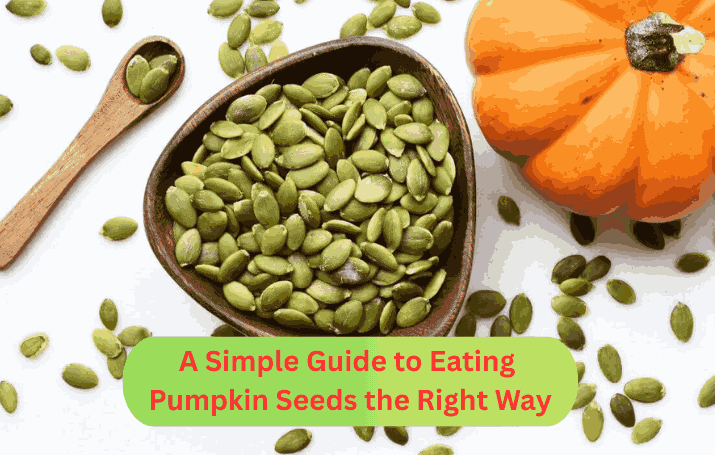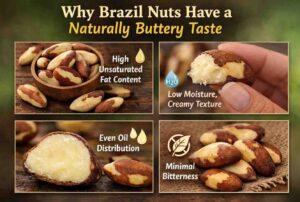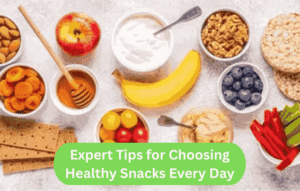
A Simple Guide to Eating Pumpkin Seeds the Right Way

Introduction
The pumpkin seeds, which are also known as pepitas, are very healthy even though they are small. They have been a part of meals around the world for generations because they are full of healthy fats, vitamins, minerals, protein, and fibre. Some people like to eat them as a snack, while others add them to different foods to make them taste better and be healthier. While many people know they should eat pumpkin seeds, they don’t know how to do it right. There are many ways to eat pumpkin seeds, and this guide will show you some of them. It will also give you some easy ideas for adding them to your daily diet.
Some reasons why pumpkin seeds should be a part of your diet
There are many health benefits to eating pumpkin seeds, not just as a crunchy snack. Within a small amount (about 30 grams)
- Magnesium – important for bone health, muscle function, and sleep.
- Zinc – supports immunity and skin health.
- Protein – helps with energy and muscle repair.
- Healthy fats – especially omega-3 and omega-6 fatty acids, good for heart and brain health.
- Antioxidants – protect the body from cell damage.
Eating pumpkin seeds regularly can support heart health, digestion, blood sugar balance, and overall well-being.
Should You Eat Pumpkin Seeds Raw or Roasted?
A lot of people aren’t sure if raw or roasted pumpkin seeds are better. The truth is that each style is valuable in its own way.
- Raw seeds keep most of their natural nutrients intact, including healthy fats, protein, and antioxidants. They taste mild and have a softer bite, which some people prefer.
- Roasted seeds give you a crispier texture and richer flavour, making them more enjoyable as a snack. The only downside is that very high heat can reduce some of their nutrients.
Tip: If you enjoy roasting, keep the heat gentle (around 150–170°C) and go easy on the oil and salt so that the seeds stay healthy as well as tasty.
Eating Pumpkin Seeds with or Without Shell
You may find pumpkin seeds sold both with their white outer shell and without it (green pepitas).
- With shell: Eating the seeds with their shells gives you extra fibre, which is good for digestion. They can be roasted whole for a crunchy snack.
- Without shell (pepitas): Easier to chew and versatile for cooking. Many people prefer them for adding to salads, smoothies, or baking.
Both options are healthy; it depends on your taste and how you plan to use them.
How Many Pumpkin Seeds Should You Eat Daily?
Moderation is key when it comes to nuts and seeds. For adults, a small handful (about 30 grams or two tablespoons) per day is enough to enjoy the health benefits without consuming too many calories.
Best Ways to Eat Pumpkin Seeds
Here are some practical ideas for including pumpkin seeds in your diet:
- As a Simple Snack: Enjoy roasted pumpkin seeds plain or lightly salted for a quick, healthy snack.
- In Breakfast Bowls: Sprinkle pumpkin seeds on top of oatmeal, porridge, or yogurt for extra crunch and nutrition.
- In Salads: Add a handful of roasted or raw pumpkin seeds to salads for added texture and a nutty flavour.
- In Smoothies: Blend pumpkin seeds into smoothies to boost protein, zinc, and magnesium content.
- As a Topping: Use them as a topping for soups, curries, or roasted vegetables.
- In Baking: Mix them into bread, muffins, or granola bars for a nutritious upgrade.
- Pumpkin Seed Butter: Similar to peanut butter, pumpkin seed butter is a great spread rich in healthy fats and protein.
Health Benefits of Eating Pumpkin Seeds the Right Way
When eaten correctly and in the right amount, pumpkin seeds can provide several benefits:
- Supports Heart Health – Magnesium and healthy fats help regulate blood pressure and cholesterol.
- Boosts Immunity – Zinc and antioxidants strengthen the body’s defence system.
- Improves Sleep Quality – Pumpkin seeds contain tryptophan, an amino acid that supports better sleep.
- Good for Digestion – The fibre in shells and seeds supports a healthy gut.
- Balances Blood Sugar – Nutrients in pumpkin seeds help regulate glucose levels.
Precautions to Keep in Mind
While pumpkin seeds are safe for most people, a few things to remember include:
- Avoid eating very large amounts, as they are calorie-dense.
- If you have nut or seed allergies, consult a doctor before adding them to your diet.
- Store seeds properly to prevent them from going rancid.
Storage Tips for Pumpkin Seeds
To keep pumpkin seeds fresh and nutritious:
- Store them in an airtight container.
- Keep them in a cool, dry place, away from sunlight.
For longer shelf life, refrigerate or freeze them.
Conclusion
Pumpkin Seeds are a simple yet powerful addition to a healthy diet. Whether you enjoy them raw, roasted, with shell, or as pepitas, they offer an impressive range of nutrients that support overall health. The best way to eat pumpkin seeds depends on your personal preference, but moderation and variety are key. By sprinkling them into meals, blending them into smoothies, or enjoying them as snacks, you can make the most of this versatile superfood.



